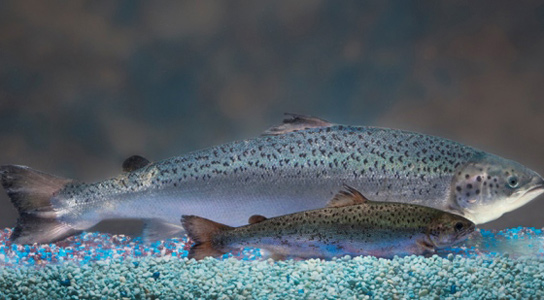
AquaBounty salmon (back) have an added growth-hormone gene that sees them grow to market size in about half the time as unmodified salmon. Credit: AquaBounty/MCT/Newscom
Scientifically unfounded assertions about transgenic foods and animals are widely circulating in the American zeitgeist. Claims that transgenic foods are responsible for the rise of autism spectrum disorder, Alzheimer’s disease and type 2 diabetes are seen in different media, from documentaries to the news.
Using genetic modification of animals to reduce food costs and improve quality is what researchers are trying to get at. Getting funding for GE animals is problematic. 0.1% of research grants from the US Department of Agriculture (USDA) have gone to GE food animals since 1999. There have been plenty of projects that have been shelved due to a lack of funding. Instead of using genetic engineering, researchers have had to focus on conventional breeding techniques to create specific traits, which is inefficient.
There is the case of a fast-growing salmon developed by AquaBounty in Maynard, Massachusetts that has been under review by the FDA since 1995. Back in 2010, the FDA deemed it safe for human consumption but the agency has yet to make a final decision on the matter.
Legislation introduced last year in the US House of Representatives and the Senate would ban the FDA from approving such projects. The main fears about this salmon come from salmon-exporting states like Alaska, Washington, and Oregon, because an inexpensive new source would undermine the industry.
AquaBounty has spent more than $60 million in the last 17 years while its salmon has been under review. Outside of the USA, prospects are better. Brazil and China have approved projects in transgenic pigs, goats, cattle, sheep, and crops. China invested nearly $800 million between 2008 and 2012.









Be the first to comment on "Transgenic Animal Research Lacks Funding & Approval in the USA"